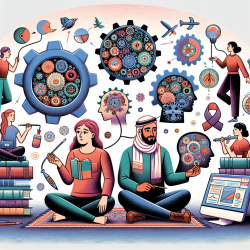Introduction
Globalization is a multifaceted phenomenon that significantly influences the social determinants of health (SDH), which are the conditions in which people live and work. These determinants affect individuals' opportunities to lead healthy lives, particularly for children who are in critical stages of development. As practitioners, understanding the pathways through which globalization impacts health equity can empower us to create better outcomes for children, especially in the field of speech-language pathology.
Understanding the Impact of Globalization
The research article "Globalization and social determinants of health: The role of the global marketplace (part 2 of 3)" by Labonté and Schrecker highlights several pathways through which globalization affects SDH. These include trade liberalization, the reorganization of production and labor markets, financial liberalization, and changes in health systems. Each of these pathways can lead to shifts in health equity, often exacerbating existing disparities.
Key Insights for Practitioners
For practitioners in speech-language pathology, understanding these pathways is crucial for developing strategies that address health inequities among children. Here are some actionable insights:
- Trade Liberalization: While it can lead to economic growth, it may also widen health disparities. Practitioners should advocate for policies that ensure equitable access to resources and services for all children, regardless of socioeconomic status.
- Labor Market Reorganization: Globalization can lead to job insecurity and economic instability for families. Speech-language pathologists can support children from affected families by providing stable and accessible online therapy services, such as those offered by TinyEYE.
- Health System Changes: Globalization often promotes market-driven health systems, which can limit access to care for marginalized populations. Practitioners should work towards inclusive health policies that prioritize children's needs and ensure access to quality speech-language services.
Encouraging Further Research
While the current research provides a comprehensive overview of globalization's impact on SDH, there is a need for more context-specific studies that focus on children and their unique health challenges. Practitioners are encouraged to engage in or support research that explores the intersection of globalization, health equity, and child development.
Conclusion
By understanding the complexities of globalization and its impact on health equity, practitioners can better advocate for and implement strategies that improve outcomes for children. Whether through policy advocacy, direct service provision, or research, speech-language pathologists have a vital role in shaping a more equitable health landscape for future generations.
To read the original research paper, please follow this link: Globalization and social determinants of health: The role of the global marketplace (part 2 of 3).










